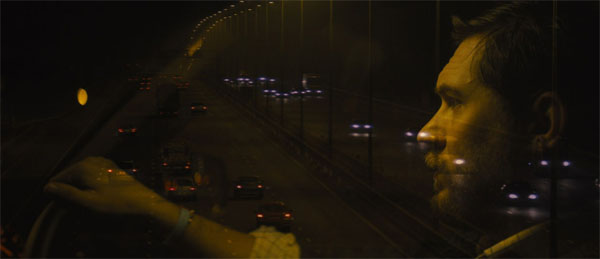“Conceived, written, shot and finished in less than nine months from page to premiere,” begins Oliver Lyttelton at the Playlist, Locke “is the second feature from Eastern Promises and Dirty Pretty Things writer Steven Knight, who made his debut only a few scant months ago with Jason Statham vehicle Hummingbird (known in the U.S. as Redemption). Ambitiously, it’s set entirely within a moving car driving from Birmingham to London, with only one actor seen on screen. Fortunately, Knight has real chops as a filmmaker, and even more fortunately, the actor is Tom Hardy, one of the most compelling screen presences around at the moment.”
For Screen‘s Lee Marshall, “Locke is a gripping and deeply cinematic human and ethical drama, and one of the few real revelations of the 2013 edition of the Venice Film Festival—where for some reason, it screened out of competition.”
“Hardy’s performance is the best yet from an actor we have seen at this year’s festival,” argues the Telegraph‘s Robbie Collin. “He adopts, pointlessly but brilliantly, a rich Welsh accent that is equal parts Richard Burton, Hannibal Lecter and Oliver Postgate’s Ivor the Engine narration. If you are asking an audience to listen to one man talking for an hour and a half, you had better make sure he is worth listening to, and minute-by-minute, Hardy has you spellbound.”
And “the film consists entirely of Hardy coolly traversing conversation strands and attempting to preserve his crumbling marriage and job in the space of an eventful 90 minute evening jaunt,” writes David Jenkins at Little White Lies. Locke “will go down as one of the better works about the psychological nuances of electronic communication.” What’s more, “Knight takes the opportunity to append a neat political dimension to the machinations, as the virtuous Locke is utterly unruffled at the prospect of roping in cash-in-hand immigrant labor to finish the job.”
“Locke turns even mundane details into flavorful dramatic grist,” writes David Rooney in the Hollywood Reporter. “What makes Hardy’s performance so effective is that he doesn’t play Locke as a quick-fix dynamo, nor as some paragon of male nobility, rushing gallantly to the side of a helpless woman. He’s simply an ordinary, even-tempered and decent man in a tough situation, whose moral compass dictates a dutiful sense of follow-through in both private and professional matters. Watching the performance in such unblinking focus is a reminder of how infrequently those qualities define a contemporary screen character.”
“Where Knight’s script goes a little wrong is its tendency to oversell a point, presumably for slower-witted viewers in the back,” writes Leslie Felperin in Variety. “Only that would explain why he feels it necessary to give Locke several rants directed at his deadbeat dead father, whom he imagines sitting in the car’s backseat… Fortunately, Hardy is gifted enough as an actor to sell these speeches, and editor Justine Wright cuts them in such a way as to suggest he’s partly saying this stuff in his own head, reducing the staginess of the device.”
“The editing makes the film seem like it is being filmed in real time, although the director revealed that each scene was shot ten separate times, with the best parts being chosen later,” notes Camillo de Marco at Cineuropa. Regardless, Locke “marks a decisive moment in Tom Hardy’s rising acting career.”
At CineVue, John Bleasdale adds that Locke sees Hardy “extending his range from the gross physicality of The Dark Knight Rises‘ Bane and Charles Bronson to that most difficult of things: normal.”
Update: “Full credit to Hardy and Knight for making a film such as Locke,” writes the Guardian‘s Xan Brooks. “Low-budget film-makers could learn a lot from their method. And yet—having stripped away all but the bare necessities, having reduced the components to a car and a man—they make a classic error of overcompensation. Locke, it occurs, is quite the most garrulous exercise in minimalism I’ve witnessed in years.”
Updates, 9/5: “This is a masterclass in how the most local, most hemmed-in stories can reverberate with the power of big, universal themes,” writes Dave Calhoun in Time Out London.
Peter van der Lugt at Twitch: “3.5 out of 5 stars and highly recommended.”
Updates, 9/8: “Cinematographer Haris Zambarloukos deserves credit for keeping the restricted space visually interesting by finding countless angles and positions to shoot from,” writes Ashley Clarke at the House Next Door, “while editor Justine Wright makes intelligent use of cross-fades to inform shifts in tone and connote passing time…. As Locke ploughs toward a moving finale, it’s rounded out by some dynamic, characterful voice acting; Olivia Colman as the nervy, pregnant ‘other’ woman, and Ruth Wilson as Locke’s understandably furious wife particularly stand out.”
Variety‘s Dave McNary reports that A24 has acquired North American rights.
Venice 2013 Index. For news and tips throughout the day every day, follow @KeyframeDaily on Twitter and/or the RSS feed. Get Keyframe Daily in your inbox by signing in at fandor.com/daily.




